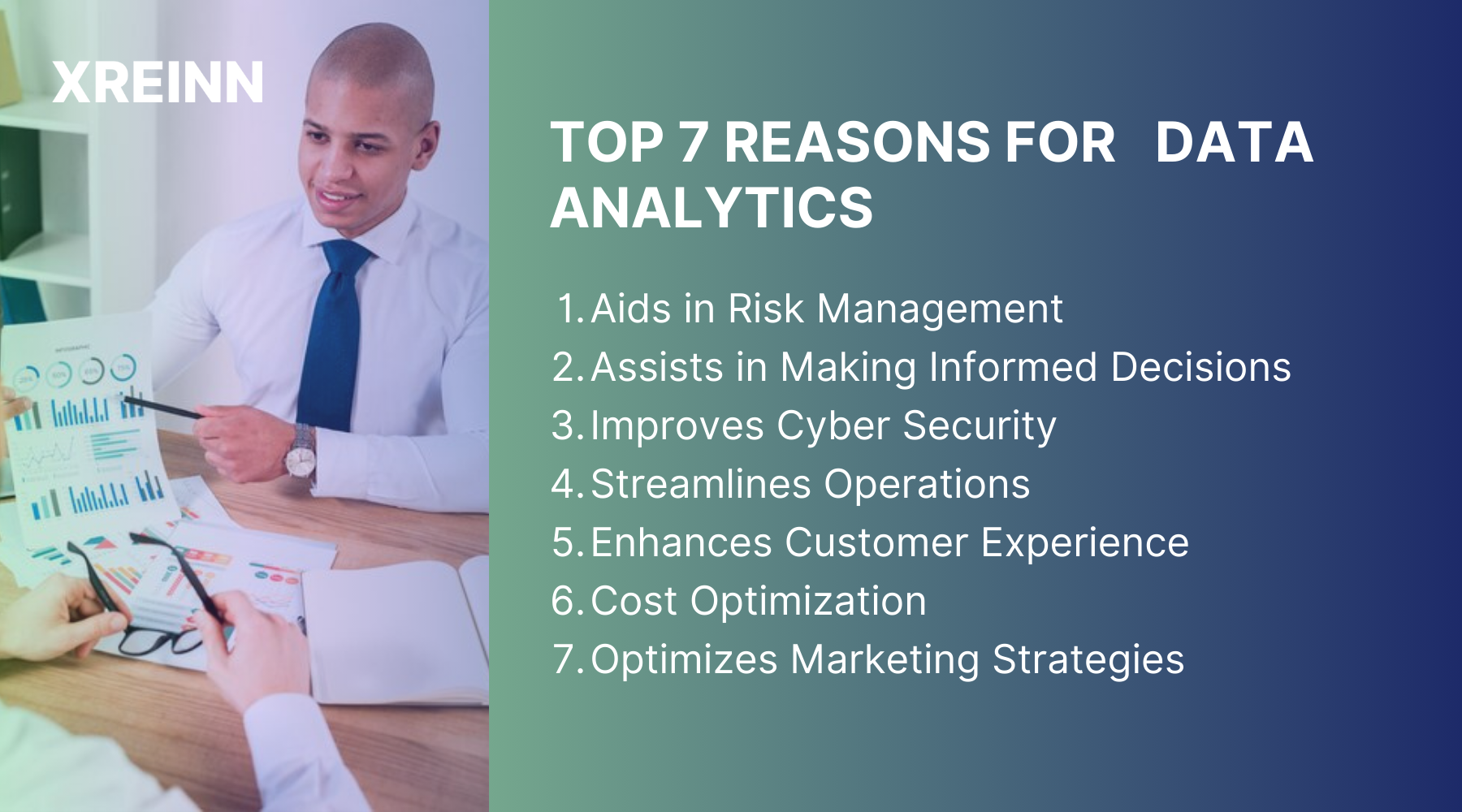Data Analytics
Why Data Analytics is a Game-Changer for Businesses: Top 7 Reasons
Jul 08, 2024
In today's fast-paced business environment, staying ahead of the competition requires more than just intuition and experience. You need to harness the power of data analytics to drive your decisions, improve operations, and enhance customer satisfaction. But why is data analytics so crucial for businesses? Here are the top seven reasons:
Top Seven Key Reasons for Data Analytics

1. Informed Decision Making
Data analytics provides businesses with the information needed to make informed decisions. By analyzing patterns and trends in historical data, you can predict future outcomes and plan accordingly. This reduces the risks associated with decision-making and allows you to take a more strategic approach to your business operations.
Imagine running a retail business and needing to determine which products to stock up on for the holiday season. With data analytics, you can review past sales data to identify which items were bestsellers in previous years. Furthermore, you can analyze current market trends to see which products are gaining popularity. By combining these insights, you can make informed decisions about your inventory, ensuring you stock products that are likely to sell, thereby maximizing your profits and minimizing waste.
2. Enhanced Customer Insights
Understanding your customers is key to delivering personalized experiences that foster loyalty and drive sales. Data analytics allows you to gather and interpret customer data, giving you a clearer picture of their behaviors, preferences, and needs.
Consider an online clothing retailer using data analytics to track customer interactions on their website. By analyzing this data, they can identify which products customers are viewing, adding to their carts, and purchasing.
Additionally, data analytics can reveal demographic information about these customers, such as their age, gender, and location. With this comprehensive view, the retailer can tailor marketing campaigns to specific customer segments, offering personalized promotions and recommendations. This targeted approach not only enhances customer satisfaction but also increases conversion rates and revenue.
3. Improved Operational Efficiency
Operational efficiency is the backbone of any successful business. Data analytics helps identify bottlenecks and inefficiencies within your processes, enabling you to streamline operations and reduce costs.
Take, for example, a logistics company using data analytics to optimize its delivery routes. By analyzing traffic patterns, delivery times, and fuel consumption, they can identify the most efficient routes for their drivers. This optimization reduces delivery times, lowers fuel costs, and improves overall operational efficiency. Additionally, data analytics can be used to monitor warehouse operations, identifying areas where processes can be streamlined or automated to further enhance efficiency.
4. Competitive Advantage
In a competitive market, having a slight edge can make a significant difference. Data analytics provides this advantage by offering insights that your competitors might not have.
For instance, a tech startup can use data analytics to analyze user feedback and behavior on their platform. By understanding how users interact with their product, they can identify areas for improvement and new features that users are requesting. This proactive approach allows the startup to stay ahead of competitors by continuously improving its product based on data-driven insights. Moreover, data analytics can help businesses identify emerging market trends, enabling them to capitalize on new opportunities before their competitors do.
5. Risk Management
Every business faces risks, whether they are financial, operational, or strategic. Data analytics plays a crucial role in identifying and mitigating these risks.
Consider a financial institution using data analytics to assess credit risks. By analyzing historical data on borrower behavior, they can develop models to predict the likelihood of default for new loan applicants. This allows the institution to make more informed lending decisions, reducing the risk of defaults and improving overall portfolio performance. Additionally, businesses can use data analytics to monitor real-time data for signs of fraud or other anomalies, enabling them to take swift action to mitigate potential risks.
6. Personalized Customer Experience
In today's market, customers expect personalized experiences. Data analytics enables you to meet these expectations by providing insights into individual customer preferences and behaviors.
For instance, a streaming service can use data analytics to analyze the viewing patterns and preferences of its subscribers. By understanding which genres, actors, or directors are most popular among different customer segments, the service can provide personalized recommendations that align with each subscriber's tastes. This personalized approach not only enhances the user experience but also increases customer retention and engagement.
Moreover, data analytics can help businesses identify opportunities for personalized marketing, such as sending targeted email campaigns based on a customer's browsing history or past purchases.
7. Strategic Planning and Forecasting
Effective strategic planning and forecasting are essential for long-term business success. Data analytics provides the insights needed to develop robust strategies and accurate forecasts.
Imagine a restaurant chain using data analytics to analyze sales data across different locations. By identifying patterns in customer preferences, peak dining times, and seasonal trends, they can develop strategic plans to optimize their menu offerings, staffing levels, and marketing efforts. Additionally, data analytics can help the chain forecast future sales and identify potential challenges, allowing it to proactively address issues and capitalize on opportunities.
This data-driven approach to strategic planning ensures that the business remains adaptable and resilient in a constantly changing market.
Beyond the Basics: The Deeper Impact of Data Analytics
While the top seven reasons highlight the fundamental benefits of data analytics, its impact goes much deeper, transforming various aspects of business operations and strategy. Here are some additional insights into how data analytics can drive significant improvements and innovation:
Enhanced Product Development
Data analytics can play a critical role in product development by providing insights into customer needs and preferences. For instance, a consumer electronics company can use data analytics to analyze customer reviews, social media feedback, and product usage data. By understanding the pain points and features that customers value most, the company can prioritize product enhancements and new developments that align with market demand.
This customer-centric approach to product development not only improves customer satisfaction but also increases the likelihood of product success.
Data-Driven Marketing
Marketing campaigns can be significantly enhanced through data analytics. By analyzing data from various sources, such as website traffic, social media interactions, and email marketing performance, businesses can gain a comprehensive view of their marketing efforts. This allows them to identify which channels and messages are most effective, enabling them to allocate resources more efficiently and improve overall marketing ROI. Additionally, data analytics can help businesses conduct A/B testing to determine the optimal design, content, and timing for their marketing campaigns, further enhancing their effectiveness.
Human Resources and Talent Management
Data analytics is also transforming the field of human resources (HR). By analyzing employee performance data, HR departments can identify high performers and potential leaders within the organization. Additionally, data analytics can help businesses understand employee engagement and satisfaction levels, enabling them to implement targeted initiatives to improve retention and productivity. For example, a company can use data analytics to identify factors that contribute to employee turnover and develop strategies to address these issues, such as offering additional training opportunities or enhancing work-life balance.
Supply Chain Optimization
Supply chain management is another area where data analytics can drive significant improvements. By analyzing data from suppliers, manufacturers, and logistics providers, businesses can gain insights into their supply chain operations and identify opportunities for optimization. For instance, a company can use data analytics to predict demand fluctuations and adjust its inventory levels accordingly, reducing the risk of stockouts or excess inventory. Additionally, data analytics can help businesses identify reliable suppliers and monitor their performance, ensuring a more efficient and resilient supply chain.
Conclusion
Incorporating data analytics into your business strategy is no longer optional—it's essential. By leveraging data analytics, you can make informed decisions, understand your customers better, improve operational efficiency, gain a competitive edge, manage risks, deliver personalized experiences, and plan strategically for the future.
The benefits of data analytics extend beyond mere numbers; they translate into tangible improvements in performance, customer satisfaction, and profitability. By understanding and embracing the power of data analytics, you can unlock new opportunities, drive innovation, and ensure the long-term success of your business. So, if you haven't already, it's time to start your data analytics journey and transform the way you do business.
Meta Description: Explore the crucial role of data analytics in business strategy. Learn how it enhances decision-making, customer insights, and operational efficiency for sustainable growth.

Data Analytics
Jun 27, 2024Master key concepts in data analytics with practical tips to enhance decision-making and achieve success in your projects and professional growth

Data Analytics
Jul 01, 2024Learn the essential stages of the data analytics workflow to turn your data into valuable business insights and drive growth.

